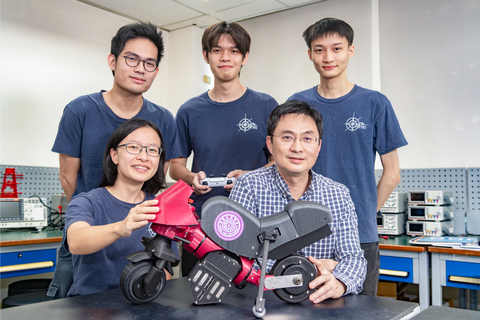NTHU Unveils Self-Balancing Motorcycle
NTHU Unveils Self-Balancing Motorcycle
NTHU students, guided by Distinguished Professor Ting-Jen Yeh from the Department of Power Mechanical Engineering, successfully created a prototype of a self-balancing motorcycle. Team members include Yu-Fen Chen (front left), Yung Tai (back row, leftmost), Chen-Yu Peng, and Wei-Shan Lee. (Photo: National Tsing Hua University)
HSINCHU, Taiwan--(BUSINESS WIRE)--With over 14 million motorcycles, Taiwan has the world’s highest motorcycle density, fueling the demand for safer rides. At National Tsing Hua University (NTHU) in Taiwan, a student team guided by Distinguished Professor Ting-Jen Yeh from the Department of Power Mechanical Engineering (PME) has created a self-balancing motorcycle using AI.
Defying gravity, it exhibits stability when stationary or at low speeds and during reverse maneuvers. Additionally, it can be operated remotely in autonomous mode.
What is difficult to believe is that this accomplishment emerged from an undergraduate capstone course within PME at NTHU. Over two semesters, four senior students—Yu-Fen Chen, Chen-Yu Peng, Wei-Shan Lee, and Yung Tai—utilized 3D printing to fabricate a scaled-down prototype of the self-balancing motorcycle. With the incorporation of carbon fiber nylon and plastic components, the undergraduate team made a significant advance toward realizing the dream of "AI-assisted riding."
While major industry players like Yamaha and Honda have delved into self-balancing technology, commercialization has remained elusive. Professor Yeh emphasized the importance of cultivating proprietary technology in Taiwan, a nation renowned as the motorcycle kingdom.
Distinguishing their approach, the NTHU student team observed that existing research predominantly favors single-steering designs or relies on high-speed rotating flywheels for balance. Drawing inspiration from Yamaha's concept, the NTHU team used machine learning to optimize the control of the dual-steering motorcycle to achieve self-balancing.
Yu-Fen Chen highlighted their strategy for achieving stationary balance, which involved placing sensors at the motorcycle's center and incorporating a counterweight block beneath the body. The sensor detects tilt angles up to 1333 times per second, with a microcomputer processing real-time signals to control the rear steering motor. As a result, the counterweight block can swiftly adjust in the opposite direction, countering shifts in the center of gravity and restoring balance.
The team's 6.5-kg conceptual motorcycle highlights the importance of weight distribution. To counter the negative effects of additional weight, Chen-Yu Peng explained that they moved the original 0.6 kg battery from the rear to the center of the body, incorporating it into the counterweight block for efficient energy-saving balancing.
Professor Yeh emphasized the importance of "virtual prototyping," guiding students through theoretical verification, computer simulations, and testing before initiating hardware implementation. Yung Tai highlighted the team's use of a "Genetic Algorithm" for AI optimization. After simulations, they determined optimal control and mechanism parameters, leading to the prototype’s production.
The prototype debuted at the 2023 "Tech New Stars" contest held by the Ministry of Economic Affairs in late November. Under remote control, the two-wheeled marvel retracted its landing gear, moved forward smoothly, and even backward, earning applause and securing the first prize in the "Intelligent Robots" category.
Despite beginning a course project, the team, fueled by recognition, aspires to continue integrating sensory and navigation technologies, including LiDAR and cameras. Their objective is to enable the self-balancing motorcycle to autonomously navigate through obstacles, ultimately making it a safer and more convenient smart two-wheeler for the future.
Contacts
Holly Hsueh
NTHU
(886)3-5162006
hoyu@mx.nthu.edu.tw

